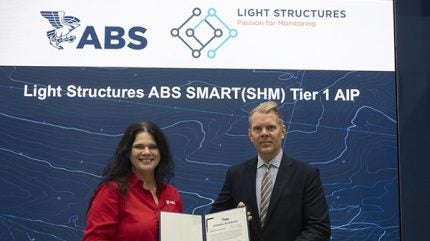
Light Structures has secured an Approval in Principle (AIP) from the American Bureau of Shipping (ABS) for its new hull monitoring concept, ARGUS-VM.
The SMART (SHM) Tier 1 AIP signifies that the ARGUS-VM meets the functional and system requirements under the ABS Guide for Smart Functions for Marine Vessels and Offshore Units.
Compared to traditional hull monitoring systems that need physical strain sensors, ARGUS-VM offers virtual measurements of hull responses by leveraging data from existing onboard systems.
This approach is stated to provide a “scalable” solution for shipowners and shipbuilders that are looking at monitor structural performance without adding any further onboard instrumentation.
ABS senior vice president for global engineering Gareth Burton said: “Our AIP for Light Structures is a continuation of the ABS activities to approve in principle new technologies that provide informed and actionable insights to vessel owners and operators on the structural health condition of their vessels.
“These insights, underpinned by real operational data, provide crew and support personnel with key information to aid in decision making.”

US Tariffs are shifting - will you react or anticipate?
Don’t let policy changes catch you off guard. Stay proactive with real-time data and expert analysis.
By GlobalDataThe ABS Guide for Smart Functions for Marine Vessels and Offshore Units offers guidance to the industry on effectively implementing smart functions on vessels.
Light Structures CEO Niklas Hallgren said: “We are proud to be the first company to receive a SMART (SHM) Tier 1 approval in principle from ABS, which validates the core concept behind ARGUS-VM.
“This recognition affirms our role as pioneers in the field of structural health monitoring and reflects our continued commitment to pushing the boundaries of what SHM can offer. ARGUS-VM demonstrates that reliable structural health indicators can be derived through software-based approaches that leverage existing vessel operational data.
“While sensorless systems like ARGUS-VM do not deliver the high-fidelity insight of fully sensor-equipped SHM solutions, they provide a powerful and scalable entry point for owners to integrate structural health awareness into their operations, and a natural step toward deeper structural insights provided by sensor-driven implementations.”
Recently, ABS signed a memorandum of understanding with Pusan National University for the development of hydrogen technologies within the maritime industry.
Focused on developing liquid hydrogen carriers and cryogenic engineering capabilities, the partnership will leverage shared resources and expertise.



